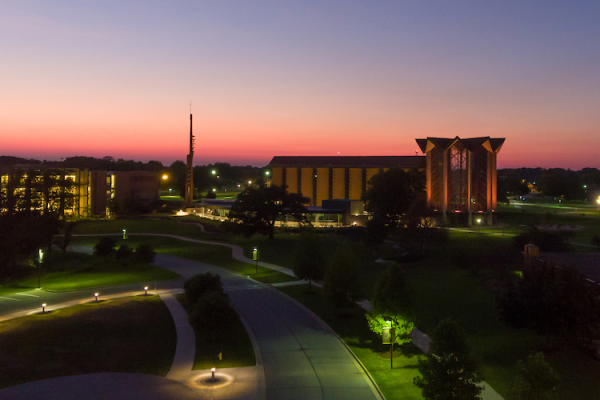Topics
Sustainability encompasses everything at Valparaiso University. Our goal is to incorporate these six topics into the university’s culture and learning. Each topic will have areas of focus with specific actions.
Energy and Emissions is a critical component to VU’s sustainability plan. By examining our energy usage and emissions from our energy building audit program, we can lower our greenhouse emissions and conserve energy.
Energy and Building Audits
Valparaiso University is conducting energy audits to determine whether campus buildings are excessively using energy and where energy consumption can potentially be reduced. Energy audits help us identify and prioritize energy conservation measures. The Energy Audit Team will review the current buildings on campus and will continue audits for any new construction.
Energy Conservation
The use of non-renewable resources for energy can damage our environmental quality. Conserving energy can also have financial benefits for the university. The energy audits that are performed generate an inventory of energy conservation measures that can potentially be implemented within our buildings.
Greenhouse Emissions
The concern for carbon dioxide is one of the biggest environmental challenges. Valparaiso University will commit to lowering their greenhouse gas emissions by implementing energy conservation initiatives, reducing lighting consumption and creating energy set points and scheduling.
Renewable Energy
Valparaiso University is investing in renewable energy educational resources. The Dale F. Kempf Solar Energy initiative and the Markiewicz Solar Research Facility are helping the advancements of renewable energy. Solar power systems generate clean energy from the sun and decreases our dependence on fossil fuels. Valparaiso University will continue to advance discoveries in renewable energy technologies.
Campus operations will have a major influence on Valparaiso University in our sustainability plan. With over 50 buildings on campus, totaling 2.1 million square feet; Valparaiso University can standardize on efficient design construction standards, protect land and grounds, and operate maintenance with efficient practices.
Design and Construction
Buildings are the largest primary source for our energy and water consumption. Building “green” can help decrease our energy use, carbon emissions, water consumption, and solid waste consumption. By standardizing construction practices that meet and exceed energy codes, Valparaiso University can be a leading example of sustainable design and construction.
Landscaping and Grounds
Valparaiso University will integrate and develop sustainable practices into campus landscape. This includes, planning and designing the landscape with wildlife habitat, native and low maintenance plants, and by keeping water conservation in mind.
Facility Maintenance Operations
Our Facility Maintenance team at Valparaiso University will operate in a manner that will protect and enhance sustainability performance and practices. Strategies to minimize waste, adopt green cleaning standards, and collect building data from our control systems will help analyze how our buildings are functioning.
Valparaiso University is surrounded by many alternative transportation options. We believe by minimizing our campus fleet and relying on these alternative transportation options, we can lower our carbon footprint.
Alternative Transportation
Valparaiso University provides a number of sustainable transportation alternatives including, ZipCar and the Valpo shuttle service. The University also promotes biking and walking for recreational transportation. The City of Valparaiso also has the V-line bus service for student use.
Biking
Biking at Valpo is an environmental-friendly and healthy alternative to driving on campus. By promoting bicycling and supporting biking infrastructure, we can help VU lead the way in sustainability and reduce our carbon emissions by limiting car use.
Campus Fleet
An effective campus fleet can help reduce our greenhouse gas emissions. By reviewing our ratio of vehicles to drivers, and what kind of vehicles are being driven, we can reduce our carbon emissions.
People are the center of Valparaiso University. It’s important to keep their health and wellness at the forefront. We want to provide productive wellness programs and good food to our people.
Wellness
Reducing the use and exposure to toxic chemicals is important for the well-being of both the university and our natural environment. We want to increase student participation in wellness programs and continue the implementation of a tobacco-free campus.
Food
We are committed to promoting healthy food choices and supporting locally and organically grown produces. By providing more locally sourced food, we can reduce the percentage of greenhouse gas emissions by limiting the distance of transportation.
Water Bottle Fill Stations
Our campus is currently expanding the amount of water bottle fill stations on campus to help reduce the amount of plastic water bottles used. We have created a map to assist with finding one on campus. You can find it here.
Our campus is a piece of a much larger ecosystem. The actions we take have a ripple effect through our campus and our natural environment. Valparaiso University will stand to protect the natural spaces and habitats that surround our campus.
Waste Reduction
Reducing our total volume of waste that goes to the landfill has a huge environmental impact. These improvements are accomplished by reduction, recycling, education, and promotion about using less.
Water
Water is one of our most precious natural resources. The University aims to conserve water and to protect our water quality.
Habitat Restoration
Valparaiso University is uniquely located next to one of our earths natural wonders, the Great Lakes. We will promote habitat restorations both on and off campus.
Valparaiso University wants to incorporate sustainability into our multi-disciplinary research, teaching, and service. Increasing opportunities for sustainability education and stewardship can start the inspiration for students to study, research, and serve for our environment.
Research and Academics
We want to pursue sustainability topics by exploring research and academic opportunities.
Outreach
Keeping sustainability relevant and cutting-edge, continuous outreach will be a key component to promote participation in our projects, student groups and programs.
Community Service
Part of Valpo Culture is a commitment to service and it shows. More than 55 hours are logged per student each year- totaling more than 220,000 hours of community outreach and service learning.
